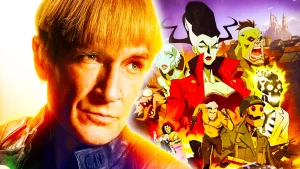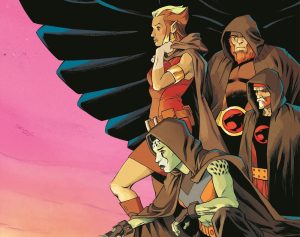It’s no secret that Batman has some of the greatest comic stories of all time. He’s one of DC’s most popular characters for a reason, and anyone who has attained this level of cultural standing has to have incredible stories that serve as his foundation. Batman has become more than a comic book character and grown to be one of the most well-known characters in all of fiction, and so it’s no surprise that plenty of people want to get into comics to see more of him. It’s natural to want to check out some of those incredible stories, but they aren’t always the best place to start.
While a lot of the Dark Knight’s best stories can be read without prior knowledge of DC, plenty aren’t. Even then, a good portion of the standalone stories are built into the backbone of the grander DC Universe, making them confusing to new readers. At other times, the stories are simply too long, too complicated, or are even better told in other beginner-friendly stories. Today, we’re going to be looking at ten Batman stories that are undeniably incredible, but aren’t the best for people just starting out reading DC.
This is not to put down any of these classic or soon-to-be classic stories. These comics are beloved for a reason and deserve all the chops they get. Rather, this is made to be a guide to those wanting to get into Batman, but not knowing where to start. We’re looking at the places you almost definitely have heard about, but probably shouldn’t check out at the beginning of your DC journey. With all that said, let’s get into it.
Starting right off the bat (pun always intended) with a criminally underrated Batman classic, “The Black Mirror” sees the Caped Crusader deal with superweapons being sold to the villains of Gotham, and the Gordon family dealing with the return of Jim’s psychopathic son, James. This story is acclaimed for its dark tone and atmosphere, and is the comic that earned Scott Snyder his spot writing the New 52 run of Batman. However, it’s not the best starting place for beginners.
Namely, this Batman story actually features Dick Grayson in the role instead of Bruce Wayne, which is sure to throw off plenty of more casual fans. In that vein, Dick is a very different Batman from Bruce, which is a big part of this story itself. While this is definitely a top-tier Batman tale, it only works with Dick behind the cowl, which isn’t what new DC fans are looking for. They’re here for more of the character they love. While Dick is great, he’s not the one they expect.
This is a standalone story that sees the inmates of Arkham Asylum take the facility over, calling for Batman to come in or they’d kill the hostages. The Dark Knight ventures deep inside, learning more of Arkham’s twisted and possibly even cursed foundations. It’s one of the most deeply psychological takes on the character. The story is often praised for digging into each of the various rogues and exploring the nuances of their psychoses, and is one of the best horror-themed comics out there.
However, that’s one of its biggest weaknesses for this list. It’s far more psychological and horror-themed than just about any other Batman comic, and so giving this to a new fan could either scare them off or set them up for disappointment if they expect most other Batman stories to be like this. Also, while A Serious House should be praised for its villain depictions, its portrayal of Batman is quite distinct from the usual. It’s not bad, but it’s certainly not what most fans would expect, and that’s never how you want to start a comics journey.
This full comic is actually made up of a trio of storylines: “Knightfall,” “Knightquest,” and “KnightsEnd.” This storyline catalogues the first appearance of the monstrous Bane, who shatters Batman’s back and forces the Dark Knight to retire. The broken hero leaves Gotham City in the hands of Azrael, but the would-be Batman flies off the deep end and becomes a bigger threat than Bane ever could be. Bruce is forced to fight for his mantle in an epic conclusion. This story is famous for everything about Bane and the illustrious Azrael-Batman armor, but there are a couple of reasons why new readers shouldn’t start here.
Most obviously, Bruce isn’t Batman for the majority of this comic. Azrael is his stand-in, and he purposefully does not act like Batman should, being a critique of the excessive violence and edgy replacements that ‘90s comics are now infamous for. Azrael’s insane, violent tendencies systematically destroy Batman’s reputation, which actually makes for a wonderful new status quo that is a perfect jumping-on point for new readers in the arc following this. This storyline is more of the end of an era than it is a place to start. It’s a fantastic first Batman event for someone to read, but not a great first Batman comic. It only gets better the more you understand Bruce and, especially, Dick’s characters.
This is the newest entry on our list, taking place from Detective Comics #1062 to #1089. The mysterious and ancient Orgham family has set their sights on saving Gotham City, only their idea of saving it involves destroying its identity and anyone who would step over what they consider the line. Batman not only has to battle them, but rediscover why he fights so hard to save his home, and come to terms with who he is and what he does. It’s a wonderful dive into the spirit of Batman, and it explores the massive impact he’s left on his home and the people within it.
Unfortunately, its two biggest strengths are its two biggest turn-offs for new readers. For one, this nuanced and heavy examination of Batman’s role and place in Gotham City doesn’t hit nearly as hard if you don’t have years of experience reading other Batman stories. This comic also pulls heavily from all parts of Batman’s mythos, which could easily seem overwhelming to newer readers. On top of all of that, this storyline is also very, very long. It’s nearly thirty issues, with backups alongside the main plot. It’s an awful lot to expect someone new to comics to take in all at once.
The Earth One line of books reimagined classic comic book heroes like Batman and Superman in a modern, more grounded reality. Costumed heroes were only something in people’s imagination until this generation decided to make it a reality. This Batman wasn’t a perfect, unshakeable warrior, but a real man who made genuine, human mistakes. On his first night on the job, his grappling hook malfunctions and Batman tumbles from a rooftop. This world made a name for itself by trying to be as close to our own as possible, and it managed to convert Batman into that format pretty darn well.
However, while this Batman definitely works for the Earth One universe, it’s not a fantastic first impression of the character. This Batman and his world are very different from the classic Gotham City comic fans know and love, and what first-time comic readers would expect. This Batman is very far removed from the standard to match the story’s more realistic, grounded formula, but in doing that, concessions about his character had to be made. This is a great alternative Batman to explore, but never one I’d give to new readers, as it sets them up for disappointment if they love this depiction, only to discover that it’s not the standard.
This storyline is famous for reintroducing Jason Todd into the Batman mythos as the antagonist Red Hood. Jason’s revival was a massive shock, as his death had been Batman’s greatest failure and deepest regret for years. The story explored the trauma of not only dying, but also Jason thinking that Bruce didn’t love him because the Joker was still breathing. It gave us a terrifying look into what Batman could be if he didn’t hold to his principles, and one of DC’s most beloved characters in Red Hood.
Still, as great as this story is, it works a lot better if you have the context of Jason being dead. His revival obviously functions way better if you saw him be dead, and while the story itself is still good, a lot of the emotional weight is gone without that. Furthermore, the climax is sure to give readers a very big misunderstanding about Batman. In the final confrontation, Bruce says that he hasn’t killed the Joker because he’s afraid he won’t be able to stop himself once he starts killing. Even plenty of long-term fans use this to justify the incorrect idea that Batman is a psychopath like the criminals he fights, instead of someone who tries to save everyone, even those he thinks he can’t.
1999 ushered in the biggest status quo change in Batman history. A massive earthquake tore Gotham City apart, and after so long of the city being the number one crime hotspot, the government declared Gotham a land all their own and barred any entrance or exit from the city. After a period of self-imposed, brooding exile, Batman returned to reclaim his city, which had been split up between various gangs led by Gotham’s worst. He formed his own team, the Batman Family, bringing in characters like Huntress and Azrael, and even introducing the second Batgirl, Cassandra Cain.
While this is one continuous story, at the same time, it’s just as much a new direction for the comics. It lasted for an entire year across every Batman title, and so “No Man’s Land” is easily the longest storyline on this list. It’s interesting and creates a fantastic starting point with its finale, but it would seem like a gargantuan task for people without a deeper knowledge of Batman or DC. It’s not impossible to start here and fall in love with the characters, but it’s probably not the best way to get into Batman’s standard storytelling.
“Batman R.I.P.” is the name of Grant Morrison’s legendary Batman storyline from their stint on the title. It follows the villainous Black Hand organization’s attempt to kill Batman. Over time, their psychological manipulation and subtle attacks make the Dark Knight question his own sanity, forcing him to face a side of himself that nobody thought existed. Along the way, this story reintroduces long-abandoned concepts like Bat-Mite and Zur-En-Arrh, masterfully reworking them to fit in the mold of modern Batman storytelling.
This storyline makes use of literally every corner of the Batman mythos, drawing inspiration from every era and adventure that came before it. While that’s a major factor as to why it’s so great, it also serves as a roadblock to newer readers. Morrison’s work is famously dense and makes liberal use of every piece of continuity, especially obscure ones. This story is set up to be Batman’s ultimate final story, and without the context of years of Batman’s storylines, readers are likely to get lost very, very easily.
This is often lauded as one of Batman’s most important and greatest stories. It perfectly explores the relationship between Batman and Joker in a single issue, focusing on the Dark Knight’s endless attempts to save the clown who refuses to believe he can be saved. It shows the Joker at his worst and Batman at his best, and places a massive emphasis on Gordon’s strength of character. This storyline is the single best example of what makes the Batman-Joker archenemy relationship work so well.
That is not to say that it’s perfect. While it being darker than the average Batman story isn’t much of an issue, the ending is. It’s left ambiguous, but it heavily implies that Batman killed the Joker in the end, which might not be the best place to start someone on reading Batman. That’s a minor thing, but the larger problem here is that there are better stories to introduce you to Batman and the Joker. This is meant to show the end of their eternal fight, whereas newer readers would be better off beginning with a retelling of their first meeting, like in Batman: The Man Who Laughs. There’s nothing wrong with starting with The Killing Joke, but there are clearly better alternatives.
This is one of Batman’s most famous comic books, and one of his most influential. The only story that can possibly contest that title is “Year One.” This comic defined what modern Batman looks like, telling an incredible story about an older Batman who comes back to save his city one last time. Every incarnation of the Cape Crusader since this comic was released has drawn inspiration from the dark yet unbreakable Batman, aiming to save Gotham and its people no matter the personal cost. Every Batman fan has to read this story at least once.
Of course, that doesn’t mean you should start with this epic story. The small issue is that it gives a slightly skewed view of how Batman typically acts. To match the grim tone of the dystopian future, Batman is far more militaristic and treats his allies, even Robin, like soldiers, which is far from how he typically acts. This Batman is just slightly more obsessed with the mission, but it’s enough to be noticeable.
The bigger issue here is that The Dark Knight Returns was created to be the end of Batman’s story. It’s him in his final days, recreating Batman and changing everything about how he operates to truly transform Gotham. By the end, Batman’s both ended his journey and restarted in a completely new way. It’s Batman’s final chapter, which is why it’s nowhere near the best place to start. You should definitely read this story, but get a better understanding of Batman’s journey first.
So there we have ten classic Batman stories that are incredible, but not the best place to start getting into DC comics. Which Batman story do you think is the worst place to start, and which is the best? What do you think? Leave a comment below and join the conversation now in the ComicBook Forum!
The post 10 Great Batman Comics That Are Terrible For DC Beginners appeared first on ComicBook.com.




